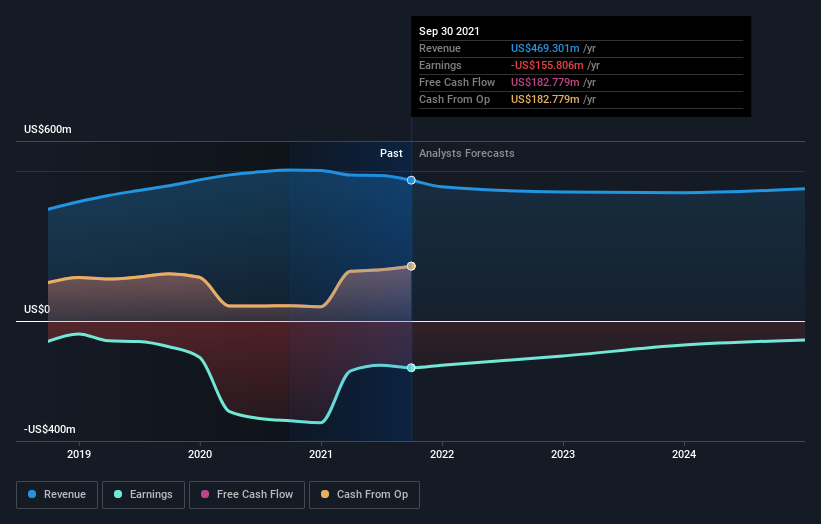- United States
- /
- REITS
- /
- NYSE:APTS
Institutional investors in Preferred Apartment Communities, Inc. (NYSE:APTS) lost 6.8% last week but have reaped the benefits of longer-term growth

If you want to know who really controls Preferred Apartment Communities, Inc. (NYSE:APTS), then you'll have to look at the makeup of its share registry. We can see that institutions own the lion's share in the company with 53% ownership. That is, the group stands to benefit the most if the stock rises (or lose the most if there is a downturn).
Losing money on investments is something no shareholder enjoys, least of all institutional investors who saw their holdings value drop by 6.8% last week. However, the 137% one-year return to shareholders might have softened the blow. They should, however, be mindful of further losses in the future.
In the chart below, we zoom in on the different ownership groups of Preferred Apartment Communities.
View our latest analysis for Preferred Apartment Communities

What Does The Institutional Ownership Tell Us About Preferred Apartment Communities?
Institutions typically measure themselves against a benchmark when reporting to their own investors, so they often become more enthusiastic about a stock once it's included in a major index. We would expect most companies to have some institutions on the register, especially if they are growing.
We can see that Preferred Apartment Communities does have institutional investors; and they hold a good portion of the company's stock. This suggests some credibility amongst professional investors. But we can't rely on that fact alone since institutions make bad investments sometimes, just like everyone does. When multiple institutions own a stock, there's always a risk that they are in a 'crowded trade'. When such a trade goes wrong, multiple parties may compete to sell stock fast. This risk is higher in a company without a history of growth. You can see Preferred Apartment Communities' historic earnings and revenue below, but keep in mind there's always more to the story.

Investors should note that institutions actually own more than half the company, so they can collectively wield significant power. Preferred Apartment Communities is not owned by hedge funds. Looking at our data, we can see that the largest shareholder is The Vanguard Group, Inc. with 9.6% of shares outstanding. In comparison, the second and third largest shareholders hold about 7.1% and 3.4% of the stock. Furthermore, CEO Joel Murphy is the owner of 1.2% of the company's shares.
On studying our ownership data, we found that 25 of the top shareholders collectively own less than 50% of the share register, implying that no single individual has a majority interest.
While studying institutional ownership for a company can add value to your research, it is also a good practice to research analyst recommendations to get a deeper understand of a stock's expected performance. There are plenty of analysts covering the stock, so it might be worth seeing what they are forecasting, too.
Insider Ownership Of Preferred Apartment Communities
The definition of an insider can differ slightly between different countries, but members of the board of directors always count. Company management run the business, but the CEO will answer to the board, even if he or she is a member of it.
Insider ownership is positive when it signals leadership are thinking like the true owners of the company. However, high insider ownership can also give immense power to a small group within the company. This can be negative in some circumstances.
We can see that insiders own shares in Preferred Apartment Communities, Inc.. In their own names, insiders own US$27m worth of stock in the US$887m company. This shows at least some alignment. You can click here to see if those insiders have been buying or selling.
General Public Ownership
With a 44% ownership, the general public, mostly comprising of individual investors, have some degree of sway over Preferred Apartment Communities. While this group can't necessarily call the shots, it can certainly have a real influence on how the company is run.
Next Steps:
It's always worth thinking about the different groups who own shares in a company. But to understand Preferred Apartment Communities better, we need to consider many other factors. For instance, we've identified 4 warning signs for Preferred Apartment Communities that you should be aware of.
If you are like me, you may want to think about whether this company will grow or shrink. Luckily, you can check this free report showing analyst forecasts for its future.
NB: Figures in this article are calculated using data from the last twelve months, which refer to the 12-month period ending on the last date of the month the financial statement is dated. This may not be consistent with full year annual report figures.
New: Manage All Your Stock Portfolios in One Place
We've created the ultimate portfolio companion for stock investors, and it's free.
• Connect an unlimited number of Portfolios and see your total in one currency
• Be alerted to new Warning Signs or Risks via email or mobile
• Track the Fair Value of your stocks
Have feedback on this article? Concerned about the content? Get in touch with us directly. Alternatively, email editorial-team (at) simplywallst.com.
This article by Simply Wall St is general in nature. We provide commentary based on historical data and analyst forecasts only using an unbiased methodology and our articles are not intended to be financial advice. It does not constitute a recommendation to buy or sell any stock, and does not take account of your objectives, or your financial situation. We aim to bring you long-term focused analysis driven by fundamental data. Note that our analysis may not factor in the latest price-sensitive company announcements or qualitative material. Simply Wall St has no position in any stocks mentioned.
About NYSE:APTS
Preferred Apartment Communities
Preferred Apartment Communities, Inc. (NYSE: APTS) is a real estate investment trust engaged primarily in the ownership and operation of Class A multifamily properties, with select investments in grocery anchored shopping centers, Class A office buildings, and student housing properties.
Fair value with mediocre balance sheet.


